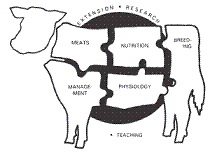Animal Science, Department of

Nebraska Beef Cattle Reports
Date of this Version
2021
Citation
Published in 2021 Nebraska Beef Cattle Report, University of Nebraska Extension Publication MP110
Abstract
To evaluate the effects of diet and quality grade on tenderness and oxidative damage to proteins, strip loins from USDA Upper 2/3rd Choice and Select- grade carcasses were obtained. Steers were fed either a diet containing dry rolled corn, steam flaked corn, dry rolled corn with 30% dried distillers grains with solubles, or steam flaked corn with 30% dried distillers grain with solubles. Results suggest that steaks from steers fed dry rolled corn are more objectively tender than steam flaked corn; in addition, steaks grading USDA Upper 2/3rd Choice steaks were more tender when compared to USDA Select quality grade. In contrast to previous research, no tenderness differences were detected between steaks from steers with or without dried distillers with solubles. Proteomic analysis revealed increased oxidative damage of myofibrillar proteins. Steaks graded as USDA Upper 2/3rd Choice steaks were determined to generally have increased oxidative damage to glycolytic, structural, and heat shock proteins, compared to USDA Select quality grade. While samples from steers fed dry rolled corn were more tender and had increased myofibrillar oxidative damage from steers fed DRC with distillers grains, steam flaked corn- related treatment displayed the inverse response. Overall, results support the relationship between marbling and tenderness, and suggest oxidative stress may be a factor involved in this difference.
Included in
Large or Food Animal and Equine Medicine Commons, Meat Science Commons, Veterinary Preventive Medicine, Epidemiology, and Public Health Commons


Comments
Copyright © 2020 The Board of Regents of the University of Nebraska.